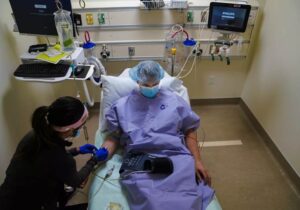I am waiting for the dermatologist, paper gown open to the back. I made this appointment in search of a medical diagnosis due to a bruise, or discoloration, under my big toe on my left foot.
Based on my experience, some physicians keep patients waiting for long periods of time in the exam room. I brought a book to read. This particular dermatologist is one that usually runs on time; on this visit the wait is 30 minutes.
In the exam room, the table folds into more of a chair shape. So I sit, book in hand, and initially feel relatively comfortable. But then I begin to notice the cold. I’ve been asked to remove my clothes, and the paper gown doesn’t offer much in terms of warmth.
In Search of a Medical Diagnosis
I’ve been to see this dermatologist only once previously. My husband is a regular thanks to basal cell carcinoma. Over the years, this dermatologist has dug out small hunks of my husband’s skin for lab testing. Other suspicious spots were zapped with liquid nitrogen, all in an effort to keep his cancer in check.
My first visit was nearly two years ago. Since I am fair-skinned, and given my husband’s experience, I wanted to get a baseline reading for any potential skin damage. Fortunately, I got a thumbs up. Skin all clear, with a parting, ‘See you next year.’
I didn’t return in a year but return only when prompted by a specific concern. The bruise under my big toe seems odd to me. When it appeared, I remembered this happening before, the sudden appearance of what seems to be a bruise under the toenail on my left foot. The previous ‘bruise’ eventually disappeared without incident.
I find the bruise a bit unnerving though. I don’t remember injuring my foot or dropping a heavy object on my toe. And I’m not a runner so I haven’t hurt my toe by repetitive pounding against the unforgiving end of a running shoe. Furthermore, there is no pain, as might be expected with a bruise or an injury to the toe.
A quick search on the Internet reveals that in some cases, although rare, a bruised toe may signify a subungual melanoma, a type of skin cancer under the nail. Given that I have no explanation for the bruised looking toe, and that it has been over a year since my last visit to the dermatologist, I make an appointment.
I’m anxious for some professional expertise, hoping the medical diagnosis is right.
Why Worry About a Bruise?
As a patient advocate, I am aware of concerns in healthcare regarding the over-use of medical resources. Do I really believe my bruised toenail is melanoma? I honestly don’t know. I could take a wait and see approach. I’m bothered though that this discolorization under my big toe has occurred before. Just because a symptom goes away doesn’t mean there isn’t a problem.
Perhaps this is an indication of something more serious. When something is wrong in the body, when there is an underlying illness, there are often signs. And sometimes these indicators are brushed off either by the patient, or the physician, or both. As a result, there is a failure to make a link to the real issue, to make the right diagnosis.
This failure to make the critical connections is what happened with my sister. When she reported to her physician of being out of breath during her regular walks, it was attributed to getting older. When my sister developed a hacking cough, she was given antibiotics for an infection, and when my sister began to have mini-strokes, she was treated for cardiovascular issues.
There was a failure to make the link to the underlying problem.
Five days before she died, my sister was told she had lung cancer.
For my sister, the delays in a medical diagnosis were too costly.
When Seeking a Medical Diagnosis, Be Persistent
I do not want to be surprised by serious illness, or even death. Although I know I may have little control over such outcomes, I can listen to my body, and to question when things seem amiss. There are always clues. So here I am in the doctor’s office with my toe.
The dermatologist tells me it looks like a bruise. She’s quite certain it is a bruise, but she asks me to come back in two months. She’s covering her bases, which is fair.
I am covering my bases as well. It is my body. It is okay to ask, and to ask again. I accept her diagnosis, but I make the appointment.



